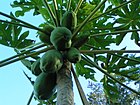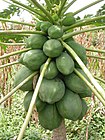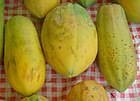Note: This is a project under development. The articles on this wiki are just being initiated and broadly incomplete. You can Help creating new pages.
Carica papaya - Madhukarkati
The papaya is a large tree-like plant, with a single stem growing from 5 to 10 m (16 to 33 ft) tall, with spirally arranged leaves confined to the top of the trunk.
Contents
- 1 Uses
- 2 Parts Used
- 3 Chemical Composition
- 4 Common names
- 5 Properties
- 6 Habit
- 7 Identification
- 8 List of Ayurvedic medicine in which the herb is used
- 9 Where to get the saplings
- 10 Mode of Propagation
- 11 How to plant/cultivate
- 12 Commonly seen growing in areas
- 13 Photo Gallery
- 14 References
- 15 External Links
Uses
digestive disorders, slow-healing wounds, diabetes, hypertension, high blood pressure, malaria, ulcer, boils, wounds
Parts Used
Fruits, Leaves, Seeds, Flowers.
Chemical Composition
the green fruit is reported to contain 26 calories, 92.1 g H2O, 1.0 g protein, 0.1 g fat, 6.2 g total carbohydrate, 0.9 g fiber, 0.6 g ash, 38 mg Ca, 20 mg P, 0.3 mg Fe, 7 mg Na, 215 mg K, 15 ug beta-carotene equivalent[1]
Common names
| Language | Common name |
|---|---|
| Kannada | pappaya hannu |
| Hindi | Papita |
| Malayalam | |
| Tamil | pappALi |
| Telugu | |
| Marathi | NA |
| Gujarathi | NA |
| Punjabi | NA |
| Kashmiri | NA |
| Sanskrit | Erand karkati |
| English | Pawpaw, papaya |
Properties
Reference: Dravya - Substance, Rasa - Taste, Guna - Qualities, Veerya - Potency, Vipaka - Post-digesion effect, Karma - Pharmacological activity, Prabhava - Therepeutics.
Dravya
Rasa
Katu, Tikta
Guna
Laghu, Ruksa, Tikshna
Veerya
Ushna
Vipaka
Karma
Kaphavatahara, Hridya
Prabhava
Habit
Identification
Leaf
| Kind | Shape | Feature |
|---|---|---|
| Simple | 2 ½ ft wide | Stems appear as a trunk, are hollow, light green to tan brown, up to 8″ in diameter, and bear prominent leaf scars. |
Flower
| Type | Size | Color and composition | Stamen | More information |
|---|---|---|---|---|
| Bisexual | 2-6cm long | white | 5-10 | Flowers are solitary or small cymes of 3 individuals |
Fruit
| Type | Size | Mass | Appearance | Seeds | More information |
|---|---|---|---|---|---|
| oval | Fruits weigh from 0.5 up to 20 lbs | Fruit are borne axillary on the main stem | usually singly but sometimes in small clusters | many | {{{6}}} |
Other features
List of Ayurvedic medicine in which the herb is used
- Vishatinduka Taila as root juice extract
Where to get the saplings
Mode of Propagation
How to plant/cultivate
Papaya succeeds in tropical and subtropical areas, where it can be found between 32°N and S. It produces best at elevations below 900 metres, though it can also succeed as high as 2,100 metres near the equator[3]
Commonly seen growing in areas
Lower rainfall, Island, Cooler temperature.
Photo Gallery
Use this picture carefully, as the shown flowers aren't Papaya-flowers, but decorative, though botanical not precise Lilium-flowers.
References
External Links
- Ayurvedic Herbs known to be helpful to treat digestive disorders
- Ayurvedic Herbs known to be helpful to treat slow-healing wounds
- Ayurvedic Herbs known to be helpful to treat diabetes
- Ayurvedic Herbs known to be helpful to treat hypertension
- Ayurvedic Herbs known to be helpful to treat high blood pressure
- Ayurvedic Herbs known to be helpful to treat malaria
- Ayurvedic Herbs known to be helpful to treat ulcer
- Ayurvedic Herbs known to be helpful to treat boils
- Ayurvedic Herbs known to be helpful to treat wounds
- Herbs with Fruits used in medicine
- Herbs with Leaves used in medicine
- Herbs with Seeds used in medicine
- Herbs with Flowers used in medicine
- Herbs with common name in Kannada
- Herbs with common name in Hindi
- Herbs with common name in Tamil
- Herbs with common name in Sanskrit
- Herbs with common name in English
- Habit - Herb
- Index of Plants which can be propagated by Seeds
- Index of Plants which can be propagated by Cuttings
- Herbs that are commonly seen in the region of Lower rainfall
- Herbs that are commonly seen in the region of Island
- Herbs that are commonly seen in the region of Cooler temperature
- Herbs












